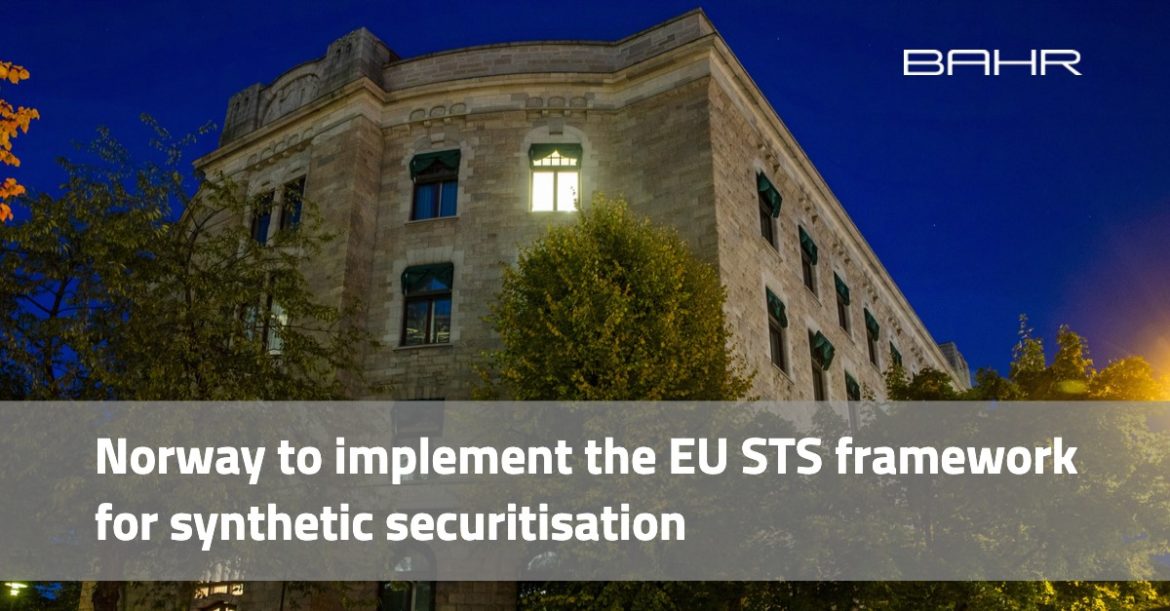Norway to implement the EU STS framework for synthetic securitisation

The EU Securitisation Regulation (Regulation (EU) 2017/2402) sets out a general framework for securitisations within the EU and a specific framework for simple, transparent and standardised securitisations (STS). Under the original regulation, only traditional ‘true sale’ securitisations could obtain the STS label. In order to stimulate the market for synthetic securitisation in addition to the traditional ones, the EU has recently amended (1) the EU Securitisation Regulation and the CRR to provide an STS framework for synthetic securitisations excluding arbitrage securitisations (the “Amending Regulations”). The Legislative Amendments will incorporate the Amending Regulations into Norwegian law in order to allow Norwegian banks to benefit from the same synthetic STS regime as banks in the EU.
The purpose of the STS framework is to move away from the very complex and opaque securitisations that fuelled excessive risk-taking and magnified the subprime mortgage crisis in 2008-2009. As the name implies, the criteria for attaining the STS label seek to make the securitisation more simple, transparent and standardised and thereby making it easier for investors to assess and adequately price the risk of their investment. In brief, the potential benefits of an ‘STS securitisation designation’ can be summarized as follows:
- Investors may derive comfort from the fact that the structure of the securitisation has been rigorously examined to obtain the STS label.
- Exposures to STS securitisations (securitisation positions) receive more favourable capital treatment under the CRR if certain conditions are met.
- In the case of true sale securitisations, the above factors may in turn make the securities more liquid, resulting in lower spreads and cheaper funding. For synthetic securitisations, the benefit for the protection buyer lies in a more favourable capital treatment of the senior tranche, which is normally retained by the protection buyer.
In addition to the introduction of an STS framework for synthetic securitisations, the Amending Regulations make certain amendments in respect of securitisation of non-performing exposures (NPEs). The Amending Regulations seek to make it easier and more attractive for market participants to securitise NPEs, acknowledging the fact that securitisation is an efficient tool in managing portfolios of NPEs. This is particularly relevant in the wake of the COVID-19 crisis, which is expected to result in an increase of NPEs on European banks’ balance sheets.
As explained in our previous newsletter published on 8 December 2020, the transfer of loans to the Securitisation Special Purpose Entity (SSPE) as part of a true sale securitisation will be fully exempt from the requirement in Section 45 of the Financial Contracts Act to obtain the debtor’s prior consent to any transfer. In the Consultation Paper the FSAN proposes to introduce a requirement for tacit consent by the debtor prior to transfer of a defaulted loan to the SSPE. Specifically, the proposal entails that the debtor may refuse the transfer of a defaulted loan within a period of minimum three weeks following receipt of notice of the transfer. The rationale offered by the FSAN for special treatment of defaulted exposures is that the debtors will be in a particularly vulnerable position and that the transfer of such exposures to an SSPE may affect the debt collection process to the detriment of the debtor. In BAHR’s view, the FSAN’s proposal is slightly surprising and could lead to unforeseen consequences. Firstly, the legislator has previously considered whether there is a need for the debtors’ consent when securitising loans and decided against it on the basis that (i) the debtors will keep all of their existing rights, (ii) the servicer will be a regulated financial institution, (iii) such requirement could reduce the feasibility of securitisation, and (iv) the debtors are entitled to receive information about the securitisation prior to closing. It is difficult to see any weighty arguments in favour of treating defaulted loans any different. Secondly, the term ‘defaulted loans’ has not been more closely defined in the legislative proposal, leaving the question open whether a tacit consent is required only in the context of an NPE securitisation or if it would extend to any securitisation where one or more of the underlying exposures are in default at the time of transfer. If the latter interpretation is correct, this could potentially create some issues in relation to securitisation of loans which are performing at the relevant pool selection cut-off date and which subsequently go into default prior to the closing date.
The FSAN’s proposal is subject to a consultation period ending on 29 October 2021, following which the Ministry of Finance will publish a proposal for legislative amendments. The amending legislation could potentially be passed as early as this fall, or alternatively during the spring of 2022.
(1) Regulation (EU) 2021/557 and Regulation (EU) 2021/558
